Everything you need to know about the 2025 Grammy Awards
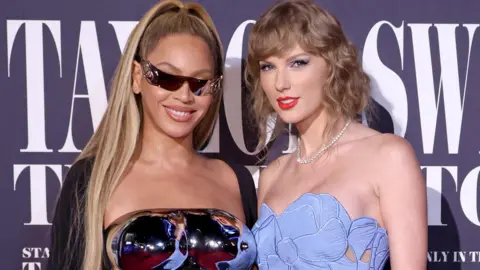 Getty Images
Getty ImagesThe Grammys are music's biggest night, both literally and figuratively.
The ceremony, which takes place in LA on Sunday night, runs for a staggering eight hours, attracting the biggest stars in pop, rock, country and hip-hop.
Organisers will hand out 94 awards, recognising everything from best pop album to best choral performance.
Beyoncé and Taylor Swift have both confirmed their attendance, as they square off in the album of the year category for the first time since 2010 (Swift won on that occasion, fact fans).
There'll also be performances from Charli XCX, Sabrina Carpenter, Benson Boone, Shakira, Stevie Wonder, Teddy Swims and Raye - and an in memoriam tribute to Thriller producer Quincy Jones.
Here's everything you need to know about the ceremony.
1) Who's going to win album of the year?
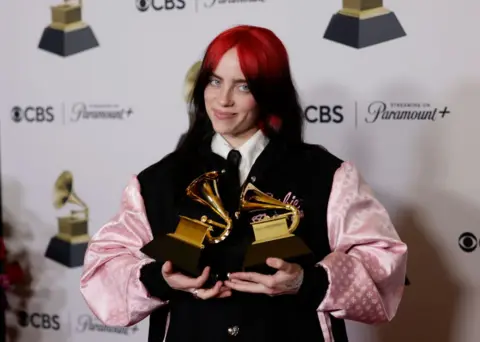 Getty Images
Getty ImagesThe big question of the night is whether Beyoncé will finally win album of the year, after four previous losses in the category?
During last year's ceremony, her husband Jay-Z addressed the oversight, telling the audience: "I don't want to embarrass this young lady, but she has more Grammys than everyone and never won album of the year. So even by your own metrics, that doesn't work."
Beyoncé's latest record, Cowboy Carter, is a wildly ambitious attempt to contextualise and commemorate the black roots of country music. It's the sort of thing that delights Grammy voters, who traditionally prefer albums that elevate America's musical history over contemporary, cutting-edge productions.
But the album's excessive length - including a few weaker tracks in its latter half - could count against it.
Billie Eilish is currently the bookmakers' favourite with her third album Hit Me Hard and Soft. Mixing passionate power ballads with violent electronic shifts and hip-hop swagger, it marks a new evolution in the star's songwriting partnership with her brother, Finneas.
Charli XCX's Brat is a career-defining pop record that became a cultural phenomenon. The best-reviewed album of 2024, it's probably too abrasive for the Grammys' more conservative voters, but that's their loss.
And you'd have to be crazy to ignore Taylor Swift. Her 11th album, The Tortured Poets Department, was the biggest-seller of last year; a fact that will undoubtedly be taken into account, even if the record is one of her weaker efforts.
If she wins, Swift will collect her fifth album of the year trophy - more than any other artist in Grammy history.
2) What about the other big prizes?
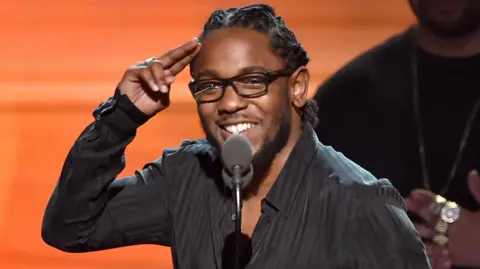 Getty Images
Getty ImagesOne of the year's most stacked categories is record of the year - better understood as "best single".
Aside from a rogue nomination for The Beatles (see below), the shortlist reflects a stellar year for pop music, with Sabrina Carpenter's Espresso and Charli XCX's 360 up against Beyoncé's Texas Hold 'Em and Billie Eilish's Birds Of A Feather.
But the front-runner is Kendrick Lamar's Not Like Us. A furious take-down of his rap nemesis, Drake, it's as catchy as it is legally contentious. If it wins, it would be only the second hip-hop single to win the category, following Childish Gambino's This Is America in 2019.
In the parallel song of the year prize - which recognises achievement in songwriting - the smart money is on Bruno Mars and Lady Gaga's Die With A Smile.
Both artists are perennial Grammy favourites, and their virtuoso ballad will be catnip to voters.
Their competition includes Shaboozey's A Bar Song (Tipsy), which was America's longest-running number one single of 2024. However, the fact that it's based on a previous hit (J-Kwon's Tipsy) is likely to count against it.
Chappell Roan's breakout single Good Luck Babe is another strong contender, notable for its soaring high notes and a piercing lyric that skewers internalised homophobia. Billie Eilish's gossamer ballad Birds of a Feather is a similar masterclass in songcraft - making this category one of the hardest to predict.
By contrast, the coveted best new artist prize is pretty much a two-way split between Chappell Roan and Sabrina Carpenter, both of whom established a dominant chart presence in 2024 after years on the pop sidelines.
That's bad news for the sole British nominee, six-time Brit Award winner Raye. But at least she's in good company, alongside breakout rap star Doechii and big-hearted pop singer Teddy Swims.
- Beatles and Rolling Stones win early Grammy Awards
- Grammy Awards 2025: List of winners and nominees
- Rowdy after parties cancelled: why this year's Grammys will be sombre
- Beyoncé surpasses Jay-Z in all-time Grammy nominations
- How rave culture inspired Charli XCX's Brat
- Critics praise Billie Eilish's "bold and brave" new album
- Chappell Roan interview: 'I'd be more successful if I wore a muzzle'
3) Which Grammy records could be broken?
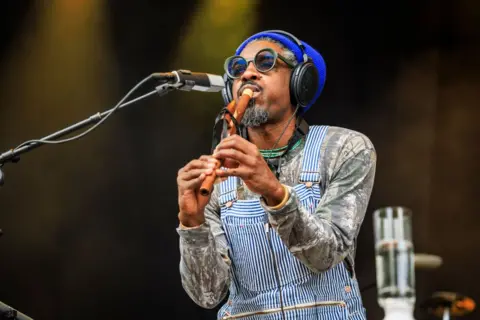 Getty Images
Getty ImagesBeyoncé's Cowboy Carter has 11 nominations, potentially making it the most-rewarded album in Grammy history.
The record is currently held by Santana, who got nine trophies for his album Supernatural in 2000 (coincidentally, the same year that Beyoncé received her first Grammy nomination, as part of Destiny's Child).
And if Cowboy Carter doesn't take home best album, Beyoncé still breaks a record, for the most nominations in that category without a win.
Billie Eilish could become the first female artist to win Record of the Year three times with Birds of a Feather. Paul Simon and Bruno Mars are the only other artist with three wins in the category.
Rapper turned flautist André 3000 is also poised to make history. If he wins best instrumental composition, he does so with the longest song title in Grammy history: I Swear, I Really Wanted To Make A 'Rap' Album But This Is Literally The Way The Wind Blew Me This Time.
The current record holders, in case you were wondering, are Oklahoma band The Flaming Lips. In 2007, they won best rock instrumental performance for the magnificently-titled The Wizard Turns on the Giant Silver Flashlight and Puts On His Werewolf Moccasins.
4) Who votes for the Grammys?
 Yellow Studio New York
Yellow Studio New YorkMore than 13,000 members of the Recording Academy vote for the Grammys every year - including musicians, producers, lyricists, and even the people who write CD liner notes.
To qualify, they must be currently working in the music industry, and pay an annual subscription of $150 (£120). All former winners are also eligible to vote.
Every member is allowed to vote in up to 10 categories across three fields, such as rock, classical and R&B. They are encouraged only to vote in genres where their expertise lies.
Additionally, every member, regardless of their background, gets to vote for the six biggest awards of the night. Those are: album of the year, record of the year, song of the year, best new artist, songwriter of the year and producer of the year.
The 2025 awards recognise music released between 16 September 2023 and 30 August, 2024. The winners are not revealed until the ceremony.
5) How did The Beatles get nominated?
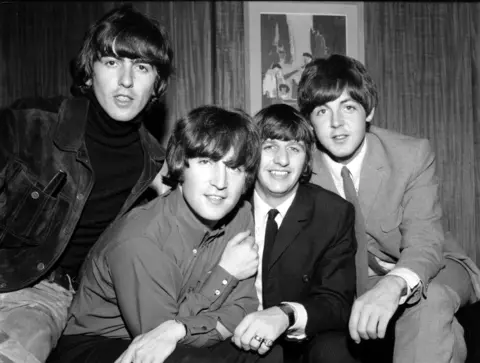
The Beatles might have broken up 55 years ago, but they're up for two prizes on Sunday: record of the year and best rock performance.
Both nominations recognise Now and Then, a song that John Lennon demoed in the 1970s, and which was finally completed by his surviving bandmates Paul McCartney and Ringo Starr last year.
Grammy voters, with their eyes firmly trained on the past, rarely miss an opportunity to reward the Beatles. Eight years ago, for example, the band's documentary Eight Days a Week: The Touring Years beat Beyoncé's groundbreaking Lemonade for best music film.
In some ways, that's correcting an historic wrong. In their prime, the Beatles were nominated for record of the year four times - for I Want to Hold Your Hand, Yesterday, Hey Jude and Let It Be - but lost every time.
A win in 2025 would prove that Beatlemania never fades - but voters may be put off by The Beatles' use of machine learning (a form of artificial intelligence), which was used to clean up Lennon's scratchy old cassette recordings.
The Recording Academy's rules on AI say that "only human creators" can win Grammys, and that "the human authorship component of the work submitted must be meaningful".
That's true in the case of Now And Then, but many creators remain sceptical of the technology.
6) How will the California wildfires affect the ceremony?
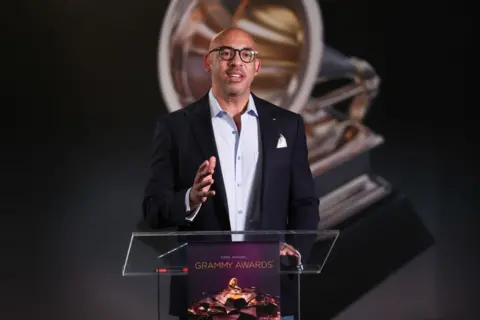 Getty Images
Getty ImagesQuite a lot.
All the hoopla surrounding the Grammys has gone. No pre-parties, no after-parties. Everything except the ceremony itself has been cancelled. All the money that would have been spent on champagne and vol au vents is being funnelled into relief efforts.
The Recording Academy and its affiliated MusiCares charity have also set up a Fire Relief fund, which has so far pledged more than $3.2 million (£2.6 million) in emergency aid to assist music professionals affected by the fires.
And the telecast itself will reflect the devastation, with segments honouring the first responders who risked their lives to tackle the inferno and protect the vulnerable.
"We'll still have performances, we'll still have awards and honour music," Recording Academy CEO Harvey Mason, Jr told Variety magazine.
"But you'll know that something's happened, and you'll know that we're using music to do good."
As part of that effort, Bruno Mars and Lady Gaga will “a special tribute to the city of Los Angeles and those affected by the wildfires,” the Grammys announced on Saturday.
7) Is there a list of Grammy performers?
 Getty Images
Getty ImagesYou betcha. So far, the list includes:
- Benson Boone
- Sabrina Carpenter
- Jacob Collier
- Sheryl Crow
- Billie Eilish
- Cynthia Erivo
- Charli XCX
- Doechii
- Herbie Hancock
- Lady Gaga
- Brittany Howard
- John Legend
- Bruno Mars
- Chris Martin
- Janelle Monáe
- Brad Paisley
- Raye
- Chappell Roan
- Shakira (pictured)
- Teddy Swims
- Lainey Wilson
- Stevie Wonder
- St. Vincent
8) How can I watch in the UK?
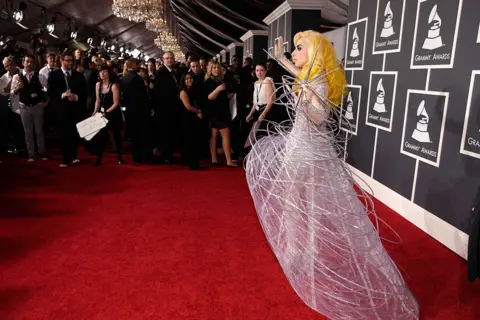 Getty Images
Getty ImagesThe ceremony is split into two parts, with the first 80 awards distributed during what's called the "premiere ceremony" at 12:30 in Los Angeles / 20:30 in London on Sunday.
It's often worth tuning in. The winners in the more obscure categories are less polished and more excited about winning, and the performances are looser and, dare I say it, more musical than the grandiose set pieces you'll see later.
You can watch the whole thing on the Recording Academy's YouTube channel, and on live.grammy.com.
That's also where you want to go to watch red carpet coverage, which kicks off at 15:00 in Los Angeles / 23:00 in the UK.
Finally, the main show kicks off at 17:00 Los Angeles / 01:00 Monday in the UK. It's broadcast live in the US on CBS and streamed internationally on Paramount Plus. Speeches and select performances are usually uploaded to YouTube the following day.
9) Does any of this really matter?
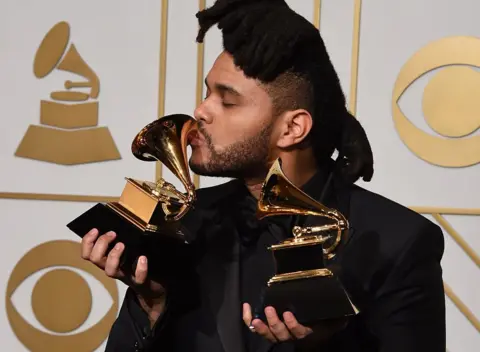 Getty Images
Getty ImagesOf course not! But have you seen what's going on everywhere else in the world?
Musicians, however take the Grammys very seriously indeed. A big win can boost album sales and bump you up festival bills.
That said, the awards themselves are notoriously ridiculous. According to legend, they were created in 1959 as a panicked reaction to the popularity of rock 'n' roll. Record companies hoped that by highlighting "good" music, they'd steer the public away from Elvis's swivelling hips.
As if to illustrate that point, they didn't hand Mr Presley a trophy until 1968, and even that was for "best sacred performance", recognising his first gospel album, How Great Thou Art.
Since then, the awards have remained wilfully arbitrary, woefully out of touch, or a combination of the two.
Famously, The Beatles won more awards after they split up than they did together; and there were no rap categories until 1989.
And if anyone still thinks that Herbie Hancock's jazz tribute to Joni Mitchell was the best album of 2008 - the year of Amy Winehouse's Back To Black and Kanye West's Graduation - I'd be interested to hear your arguments.
So if Beyoncé doesn't win on Sunday (or even if she does) don't let it affect your enjoyment of her music.
